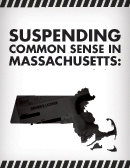Ending harmful driver’s license suspensions in Massachusetts
Massachusetts suspends driver’s licenses as punishment for crimes that had nothing to do with cars or road safety. Sound nonsensical? It is.
by Leah Sakala, March 17, 2015
Last week I attended a legislative briefing at the Massachusetts State House to present my research on what might seem like an unlikely policy: driver’s license suspensions for crimes that had nothing to do with driving or road safety. Sound nonsensical? It is.
But for more than two decades Massachusetts law has been automatically suspending the driver’s licenses of everyone convicted of a drug offense — regardless of whether or not that offense involved driving or road safety. Then, if that wasn’t enough, this policy makes them wait at least six months and then charges them $500 or more to get their driving privileges back. Since the suspension policy is automatic, judges have no say in the matter.
As our report found, this suspension policy wastes taxpayer resources, makes our roads less safe, and fundamentally disrupts the lives of people with previous drug convictions who are trying to get back on track by meeting work, family, and other personal responsibilities. And we already have other laws that deal directly with road safety and illicit substances.

Fortunately, after more than two decades of losses under this failed policy, the Massachusetts legislature is poised to finally put its foot down. Massachusetts Senator Harriette Chandler and Representative Liz Malia are introducing legislation this session to end unnecessary drivers license suspensions for unrelated drug convictions.
Our friends at EPOCA are spearheading the effort to end unnecessary suspensions in Massachusetts, and you can learn more about the issue by reading our report: Suspending Common Sense in Massachusetts: Driver’s license suspensions for drug offenses unrelated to driving.





[…] Harriette Chandler and Representative Liz Malia to end the automatic license suspension policy. We presented on the issue at a legislative briefing session earlier this year, and most recently submitted […]